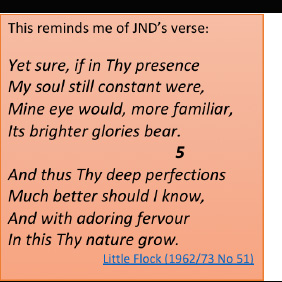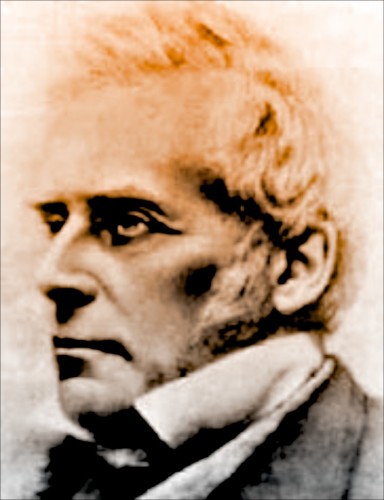
It is clear that in the 1800’s J N Darby and other godly men and women had to contend with those who taught that eternal punishment in hell was inconsistent with a loving God.
Darby produced a paper ‘Brief Scriptural Evidence on the doctrine of Eternal Punishment, for plain people’. Collected Writings Vol 7 (Doctrinal 2) page 1.
This is summarised in our posting ‘Hell is Real and Eternal’
In it, Darby listed a number of scriptures to arrest believers and make them consider that is certainly the truth. Hell, the Lake of Fire, is eternal. He wrote that ‘God meant to produce on the mind of the reader the conviction that eternal misery is the portion of the wicked, and I do not believe that He meant to produce the conviction of a lie, nor frighten them with what was not true. Now I shall quote many plain passages, adding my unhesitating conviction that the attempts to undermine this doctrine of scripture (and I have been compelled to examine a good many) have entirely failed, and that the arguments used are either dishonest, some of them flagrantly so, or contradictory and fallacious, and that all of them subvert other fundamental truths.
Here are those passages:
| Scripture: | Text | Notes |
| Matthew 3:10, 12 | And now also the axe is laid unto the root of the trees: therefore every tree which bringeth not forth good fruit is hewn down, and cast into the fire. . . he will throughly purge his floor, and gather his wheat into the garner; but he will burn up the chaff with unquenchable fire. | |
| Matthew 5:22 | But I say unto you, That whosoever is angry with his brother without a cause shall be in danger of the judgment: and whosoever shall say to his brother, Raca, shall be in danger of the council: but whosoever shall say, Thou fool, shall be in danger of hell fire. | |
| Matthew 5:29-30 | And if thy right eye offend thee, pluck it out, and cast it from thee: for it is profitable for thee that one of thy members should perish, and not that thy whole body should be cast into hell. And if thy right hand offend thee, cut it off, and cast it from thee: for it is profitable for thee that one of thy members should perish, and not that thy whole body should be cast into hell. | |
| Matthew 7:13 | Enter ye in at the strait gate: for wide is the gate, and broad is the way, that leadeth to destruction, and many there be which go in thereat. | |
| Matthew 7:23 | And then will I profess unto them, I never knew you: depart from me, ye that work iniquity.
|
Mark this and chapter 10:33, because it is impossible to believe that Christ could say these things of those who were redeemed and saved as much as others, though to be punished awhile. |
| Matthew 8:12 | But the children of the kingdom shall be cast out into outer darkness: there shall be weeping and gnashing of teeth | |
| Matthew 10:28, 33 | And fear not them which kill the body, but are not able to kill the soul: but rather fear him which is able to destroy both soul and body in hell. . . .But whosoever shall deny me before men, him will I also deny before my Father which is in heaven. | See above |
| Matthew 12:31-32 | Wherefore I say unto you, All manner of sin and blasphemy shall be forgiven unto men: but the blasphemny against the Holy Ghost shall not be forgiven unto men. And whosoever speaketh a word against the Son of man, it shall be forgiven him: but whosoever speaketh against the Holy Ghost, it shall not be forgiven him, neither in this world, neither in the world to come. | |
| Matthew 13:40, 49-50 | As therefore the tares are gathered and burned in the fire; so shall it be in the end of this world. . . So shall it be at the end of the world: the angels shall come forth, and sever the wicked from among the just, and shall cast them into the furnace of fire: there shall be wailing and gnashing of teeth. | In those two verses, 40 and 49, it will be said “world” means age or dispensation; be it so, I believe it does; but that does not affect the judgment pronounced as to that which is to follow |
| Matthew 18:8-9 | Wherefore if thy hand or thy foot offend thee, cut them off, and cast them from thee: it is better for thee to enter into life halt or maimed, rather than having two hands or two feet to be cast into everlasting fire. And if thine eye offend thee, pluck it out, and cast it from thee: it is better for thee to enter into life with one eye, rather than having two eyes to be cast into hell fire. | Here everlasting fire or hell-fire is in contrast with life; if they go into one, they do not go into the other; nor is any particular word used which. might, as they allege, make it apply to a peculiar period of happiness. Life and hell-fire are contrasted. |
| Matthew 22:13 | Then said the king to the servants, Bind him hand and foot, and take him away, and cast him into outer darkness; there shall be weeping and gnashing of teeth. For many are called, but few are chosen. | |
| Matthew 23:33 | Ye serpents, ye generation of vipers, how can ye escape the damnation of hell? | |
| Matthew 25:46 | And these shall go away into everlasting punishment: but the righteous into life eternal.
|
Now here in Greek “everlasting” and “eternal” are precisely the same word; and what one means for life, the other means for punishment. |
| Matthew 26:24 | The Son of man goeth as it is written of him: but woe unto that man by whom the Son of man is betrayed! it had been good for that man if he had not been born. | |
| Mark 3:22 | And the scribes which came down from Jerusalem said, He hath Beelzebub, and by the prince of the devils casteth he out devils | |
| Mark 8:36-37 | For whosoever will save his life shall lose it; but whosoever shall lose his life for my sake and the gospel’s, the same shall save it. For what shall it profit a man, if he shall gain the whole world, and lose his own soul? Or what shall a man give in exchange for his soul?
|
|
| Mark 9:43 | And as they came down from the mountain, he charged them that they should tell no man what things they had seen, till the Son of man were risen from the dead. | |
| Mark 16:16 | He that believeth and is baptized shall be saved; but he that believeth not shall be damned. | |
| Luke 12:4, 5, 9, 10 | And I say unto you my friends, Be not afraid of them that kill the body, and after that have no more that they can do. But I will forewarn you whom ye shall fear: Fear him, which after he hath killed hath power to cast into hell; yea, I say unto you, Fear him. . . But he that denieth me before men shall be denied before the angels of God. And whosoever shall speak a word against the Son of man, it shall be forgiven him: but unto him that blasphemeth against the Holy Ghost it shall not be forgiven. | |
| Luke 16:19-31 | There was a certain rich man, which was clothed in purple and fine linen, and fared sumptuously every day: And there was a certain beggar named Lazarus, which was laid at his gate, full of sores, and desiring to be fed with the crumbs which fell from the rich man’s table: moreover the dogs came and licked his sores, and it came to pass, that the beggar died, and was carried by the angels into Abraham’s bosom: the rich man also died, and was buried; and in hell he lift up his eyes, being in torments, and seeth Abraham afar off, and Lazarus in his bosom. And he cried and said, Father Abraham, have mercy on me, and send Lazarus, that he may dip the tip of his finger in water, and cool my tongue; for I am tormented in this flame. But Abraham said, Son, remember that thou in thy lifetime receivedst thy good things, and likewise Lazarus evil things: but now he is comforted, and thou art tormented. And beside all this, between us and you there is a great gulf fixed: so that they which would pass from hence to you cannot; neither can they pass to us, that would come from thence. Then he said, I pray thee therefore, father, that thou wouldest send him to my father’s house: for I have five brethren; that he may testify unto them, lest they also come into this place of torment. Abraham saith unto him, They have Moses and the prophets; let them hear them. And he said, Nay, father Abraham: but if one went unto them from the dead, they will repent. And he said unto him, If they hear not Moses and the prophets, neither will they be persuaded, though one rose from the dead. | |
| John 3:3, 15 | Jesus answered and said unto him, Verily, verily, I say unto thee, Except a man be born again, he cannot see the kingdom of God. . . That whosoever believeth in him should not perish, but have eternal life. | |
| John 3:36 | The Father loveth the Son, and hath given all things into his hand. He that believeth on the Son hath everlasting life: and he that believeth not the Son shall not see life; but the wrath of God abideth on him. | |
| John 5:29 | And shall come forth; they that have done good, unto the resurrection of life; and they that have done evil, unto the resurrection of damnation.
|
Here, they will tell you, “damnation” means judgment. So it does; but it is in contrast with having life. And in judgment “no flesh living shall be justified.” The judgment is at the end of all. |
| John 6:53 | Then Jesus said unto them, Verily, verily, I say unto you, Except ye eat the flesh of the Son of man, and drink his blood, ye have no life in you. | |
| John 8:24 | said therefore unto you, that ye shall die in your sins: for if ye believe not that I am he, ye shall die in your sins. | |
| Acts 1:25 | That he may take part of this ministry and apostleship, from which Judas by transgression fell, that he might go to his own place. | |
| Romans 1:18 | For the wrath of God is revealed from heaven against all ungodliness and unrighteousness of men, who hold the truth in unrighteousness. | |
| Romans 2:5-16 | But after thy hardness and impenitent heart treasurest up unto thyself wrath against the day of wrath and revelation of the righteous judgment of God; who will render to every man according to his deeds: to them who by patient continuance in well doing seek for glory and honour and immortality, eternal life: but unto them that are contentious, and do not obey the truth, but obey unrighteousness, indignation and wrath, tribulation and anguish, upon every soul of man that doeth evil, of the Jew first, and also of the Gentile; but glory, honour, and peace, to every man that worketh good, to the Jew first, and also to the Gentile: for there is no respect of persons with God.
For as many as have sinned without law shall also perish without law: and as many as have sinned in the law shall be judged by the law; (For not the hearers of the law are just before God, but the doers of the law shall be justified. For when the Gentiles, which have not the law, do by nature the things contained in the law, these, having not the law, are a law unto themselves: which shew the work of the law written in their hearts, their conscience also bearing witness, and their thoughts the mean while accusing or else excusing one another;) in the day when God shall judge the secrets of men by Jesus Christ according to my gospel. |
|
| Romans 9:22 | What if God, willing to shew his wrath, and to make his power known, endured with much longsuffering the vessels of wrath fitted to destruction:
|
God is minded to shew His wrath and make His power known. Though love, He is God, and His majesty must be maintained against rebellion and sin. |
| 1 Corinthians 1:18 | For the preaching of the cross is to them that perish foolishness; but unto us which are saved it is the power of God.
|
Now in this, as in Mark 16:16, perishing and being damned is contrasted with being saved, so that any plain person must conclude that they are not saved. Some are saved, and others perish because they reject the cross. |
| Philippians 1:28 | And in nothing terrified by your adversaries: which is to them an evident token of perdition, but to you of salvation, and that of God | |
| 2 Thessalonians 1:7-10 | And to you who are troubled rest with us, when the Lord Jesus shall be revealed from heaven with his mighty angels, in flaming fire taking vengeance on them that know not God, and that obey not the gospel of our Lord Jesus Christ: who shall be punished with everlasting destruction from the presence of the Lord, and from the glory of his power; when he shall come to be glorified in his saints, and to be admired in all them that believe (because our testimony among you was believed) in that day | |
| 2 Thessalonians 2:9-12 | Even him, whose coming is after the working of Satan with all power and signs and lying wonders, and with all deceivableness of unrighteousness in them that perish; because they received not the love of the truth, that they might be saved. And for this cause God shall send them strong delusion, that they should believe a lie: that they all might be damned who believed not the truth, but had pleasure in unrighteousness. | |
| 1 Timothy 6:9 | But they that will be rich fall into temptation and a snare, and into many foolish and hurtful lusts, which drown men in destruction and perdition. | |
| Hebrews 6:4-6 | For it is impossible for those who were once enlightened, and have tasted of the heavenly gift, and were made partakers of the Holy Ghost, and have tasted the good word of God, and the powers of the world to come, if they shall fall away, to renew them again unto repentance; seeing they crucify to themselves the Son of God afresh, and put him to an open shame. | |
| Hebrews 10:26-31 | For if we sin wilfully after that we have received the knowledge of the truth, there remaineth no more sacrifice for sins, but a certain fearful looking for of judgment and fiery indignation, which shall devour the adversaries. He that despised Moses’ law died without mercy under two or three witnesses: of how much sorer punishment, suppose ye, shall he be thought worthy, who hath trodden under foot the Son of God, and hath counted the blood of the covenant, wherewith he was sanctified, an unholy thing, and hath done despite unto the Spirit of grace? For we know him that hath said, Vengeance belongeth unto me, I will recompense, saith the Lord. And again, The Lord shall judge his people. It is a fearful thing to fall into the hands of the living God.
|
|
| Hebrews 11:27. | By faith he [Moses] forsook Egypt, not fearing the wrath of the king: for he endured, as seeing him who is invisible. | |
| James 5:20 | Let him know, that he which converteth the sinner from the error of his way shall save a soul from death, and shall hide a multitude of sins. | |
| 2 Peter 2:9 | The Lord knoweth how to deliver the godly out of temptations, and to reserve the unjust unto the day of judgment to be punished. | |
| 2 Peter 2:13, 17, 20-21 | But these, as natural brute beasts, made to be taken and destroyed, speak evil of the things that they understand not; and shall utterly perish in their own corruption. . .
These are wells without water, clouds that are carried with a tempest; to whom the mist of darkness is reserved for ever. . .For if after they have escaped the pollutions of the world through the knowledge of the Lord and Saviour Jesus Christ, they are again entangled therein, and overcome, the latter end is worse with them than the beginning. For it had been better for them not to have known the way of righteousness, than, after they have known it, to turn from the holy commandment delivered unto them |
|
| 2 Peter 3:7 | But the heavens and the earth, which are now, by the same word are kept in store, reserved unto fire against the day of judgment and perdition of ungodly men.
|
|
| 1 John 5:12 | He that hath the Son hath life; and he that hath not the Son of God hath not life. | |
| Jude 7, 11-13 | Even as Sodom and Gomorrha, and the cities about them in like manner, giving themselves over to fornication, and going after strange flesh, are set forth for an example, suffering the vengeance of. . .
Woe unto them! for they have gone in the way of Cain, and ran greedily after the error of Balaam for reward, and perished in the gainsaying of Core. These are spots in your feasts of charity, when they feast with you, feeding themselves without fear: clouds they are without water, carried about of winds; trees whose fruit withereth, without fruit, twice dead, plucked up by the roots; raging waves of the sea, foaming out their own shame; wandering stars, to whom is reserved the blackness of darkness for ever. |
|
| Revelation 14:9-11 | If any man worship the beast and his image, and receive his mark in his forehead, or in his hand, the same shall drink of the wine of the wrath of God, which is poured out without mixture into the cup of his indignation; and he shall be tormented with fire and brimstone in the presence of the holy angels, and in the presence of the Lamb: and the smoke of their torment ascendeth up for ever and ever: and they have no rest day nor night, who worship the beast and his image, and whosoever receiveth the mark of his name. | |
| Revelation 20:9-15 | And they [Satan and his army] went up on the breadth of the earth, and compassed the camp of the saints about, and the beloved city: and fire came down from God out of heaven, and devoured them. And the devil that deceived them was cast into the lake of fire and brimstone, where the beast and the false prophet are, and shall be tormented day and night for ever .
And I saw a great white throne, and him that sat on it, from whose face the earth and the heaven fled away; and there was found no place for them. And I saw the dead, small and great, stand before God; and the books were opened: and another book was opened, which is the book of life: and the dead were judged out of those things which were written in the books, according to their works. And the sea gave up the dead which were in it; and death and hell delivered up the dead which were in them: and they were judged every man according to their works. And death and hell were cast into the lake of fire. This is the second death. And whosoever was not found written in the book of life was cast into the lake of fire.
|
|
| Revelation 21:5-8 | And he that sat upon the throne said, Behold, I make all things new. And he said unto me, Write: for these words are true and faithful. And he said unto me, It is done. I am Alpha and Omega, the beginning and the end. I will give unto him that is athirst of the fountain of the water of life freely. He that overcometh shall inherit all things; and I will be his God, and he shall be my son. But the fearful, and unbelieving, and the abominable, and murderers, and whoremongers, and sorcerers, and idolaters, and all liars, shall have their part in the lake which burneth with fire and brimstone: which is the second death. |
Sosthenes
April 2018




